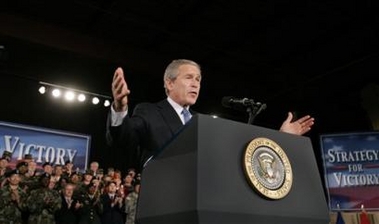|
Bush forcefully attacks Iraq critics
(AP)
Updated: 2005-11-12 10:54
US President Bush strongly rebuked congressional critics of his Iraq war
policy Friday, accusing them of being "deeply irresponsible" and sending the
wrong signal both to America's enemy and to U.S. troops.
"The stakes in the global war on terror are too high, and the national
interest is too important, for politicians to throw out false charges," Bush
said in his most combative defense yet of his rationale for invading Iraq in
March 2003.
Bush's charges brought a forceful response from senior Democrats in Congress,
who accused the president of misleading the country about the justification for
war. Sen. John Kerry, D-Mass., who ran unsuccessfully against Bush last year,
accused the president of playing "the politics of fear and smear."
Bush's speech was part of a coordinated White House effort to bolster the
president's waning credibility and dwindling support for the war, in which more
than 2,000 U.S. troops have died.

US President Bush speaks about the war against
terror at Tobyhanna Army Depot in Tobyhanna, Pa., Friday, Nov. 11,
2005.[AP] | As casualties have climbed, Bush's popularity has dropped. His approval
rating now is at 37 percent in the latest AP-Ipsos poll, an all-time low point
for his presidency.
"When I made the decision to remove Saddam Hussein from power, Congress
approved it with strong bipartisan support," Bush said in a Veterans Day speech
at Tobyhanna Army Depot.
"While it's perfectly legitimate to criticize my decision or the conduct of
the war, it is deeply irresponsible to rewrite the history of how that war
began."
Bush's remarks brought a few jabs from fellow Republicans as well as a sharp
counterattack from Democrats.
In a speech in Philadelphia, Sen. Rick Santorum, R-Pa., criticized how the
war has been presented to Americans — both by the media and the White House.
Afterward, Santorum said the war has been "less than optimal" and "maybe some
blame could be laid" at the White House. "Certainly, mistakes were made,"
Santorum said.
Sen. Chuck Hagel, R-Neb., who is weighing a run for president in 2008, has
said he agrees with Democrats who are pressing the chairman of the Senate
Intelligence Committee to move forward with an investigation into whether the
administration manipulated intelligence.
"I was probably the main driver on the Republican side because I thought we
needed the answers to whether intelligence was misused, intentionally or
unintentionally," Hagel told the Omaha World-Herald in a story published Friday.
Defending the march to war, Bush said foreign intelligence services and
Democrats and Republicans alike were convinced at the time that Saddam Hussein,
the former Iraqi leader, had weapons of mass destruction. The United Nations, he
noted, had passed more than a dozen resolutions citing Saddam's development and
possession of such weapons.
Accusing his critics of making false charges, Bush said: "These baseless
attacks send the wrong signal to our troops and to an enemy that is questioning
America's will.
"As our troops fight a ruthless enemy determined to destroy our way of life,
they deserve to know that their elected leaders who voted to send them to war
continue to stand behind them."
Senate Democratic leader Harry Reid of Nevada said Democrats would continue
to press for a full airing of the facts about prewar intelligence and said
asking tough questions was his party's way of standing with the troops.
"Americans seek the truth about how the nation committed our troops to war
because the decision to go to war is too serious to be entered into under faulty
pretenses," Reid said.
White House officials fanned out to television appearances to reinforce
Bush's argument and Republican National Committee Chairman Ken Mehlman added his
voice. He said Democrats who once worried that Saddam was amassing weapons of
mass destruction now want an investigation of the intelligence. "Maybe this
investigation will reveal that they were brainwashed," Mehlman said in a speech
to be delivered Friday evening in Fort Wayne, Ind.
Criticism about prewar intelligence has been stoked by the recent indictment
of Vice President Dick Cheney's chief of staff, I. Lewis "Scooter" Libby, in the
CIA leak investigation.
The probe aims to identify who leaked the identity of an undercover CIA
officer whose husband, a former ambassador, alleged that the administration
relied on faulty intelligence to justify the invasion of Iraq.
Kerry accused the president of playing politics on a holiday set aside to
honor veterans.
"This administration misled a nation into war by cherry-picking intelligence
and stretching the truth beyond recognition. That's why Scooter Libby has been
indicted. That's why a statement in the State of the Union Address was
retracted," said Kerry, who voted in 2002 to give Bush the authority to wage war
but later voted against additional funds for Iraq and Afghanistan
reconstruction.
"It's a dangerous day for our national security when an administration's word
is no good," Kerry said.
Bush chose to go on the road this Veterans Day to make his forceful defense
of the war, leaving Cheney in Washington to attend traditional wreath-laying
ceremonies at Arlington National Cemetery.
Sen. Edward Kennedy, D-Mass., accused Bush of using Veterans Day as "a
campaign-like attempt to rebuild his own credibility by tearing down those who
seek the truth about the clear manipulation of intelligence in the run-up to the
Iraq War."
Bush's political adviser Karl Rove, who is still under the cloud of the CIA
leak investigation, hopped Air Force One to attend the speech, an indication
that it was a political event.
Bush shared the stage with a tan Army depot vehicle, and banners behind him
read "Strategy for Victory." "Hail to the Chief," which is rarely played to mark
Bush's arrival, blared from speakers in the warehouse.
|